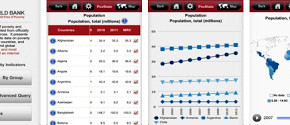
Across the globe, many people and families live on a little more than one dollar per day. The phenomenon of poverty can be understood as a global problem, but leaders and practitioners alike must develop solutions that will successfully be implemented and sustained at the local level. The deployment of advanced analytic technologies will enable institutions and organizations to deliver the most impact across neighborhoods (i.e. districts) in real time. Combating extreme poverty begins with understanding how an impoverished population is affected within their environment, and conducting analysis centered on affected communities will enable efficient planning and operations to improve the quality of life.
The availability of open data provides analysts with opportunities to explore information across multiple sectors and to employ innovative tools and techniques to facilitate poverty reduction. However, as practitioners have experienced, combating poverty on the ground is complex in countries strangled by violent conflicts, terrorist activity or distressed by natural disaster, disease, and diaspora. These elements strain entrepreneurship and investment ventures, hinder education and leadership initiatives, and curb food security and health response programs. The capability to integrate open data is imperative to understanding how solutions can be implemented to improve the lives of impoverished populations in these environments:
Program Management Data
Integrating open financial data from sources like the World Bank will allow analysts to assess trends in contract awards and highlight milestones relating to the delivery of products and services to communities.
Small Business Data
Modeling open investment data promises the persistent monitoring of loan distribution, grant awards, and micro-financing initiatives in order to streamline due diligence and align resources in the areas of greatest need.
Rural and Urban Data
Programming transaction scripts such as incident alerts will enable analysts to collect information in real-time so that decision makers can react to events occurring in the environment and adapt to changes over time.
Conflict and Criminal Data
Analyzing traditional media and social media data compiled by leading research and policy think tanks and integrating large databases from academic institutions such as START will enable analysts to create a comprehensive operating picture of local environments.
Focusing on developing solutions that will make a difference in local communities depends largely on the ability to organize and execute the integration of open data across diverse fields. Leveraging advanced tools to conduct analysis in a systematic fashion will empower leaders and practitioners to scale local strategies and improve lives for a more stable and secure world.
Post by: Dan Potocki, who directs the Initiatives Group at Praescient Analytics, a collective of subject matter experts and thought leaders committed to solving the biggest problems with advanced analysis technologies.